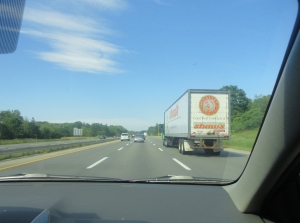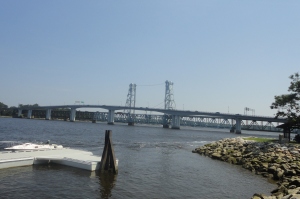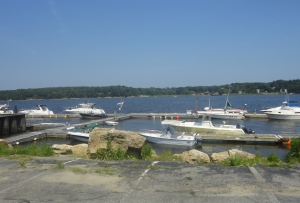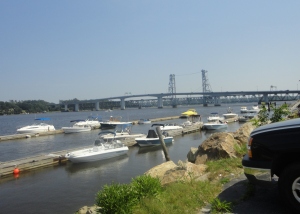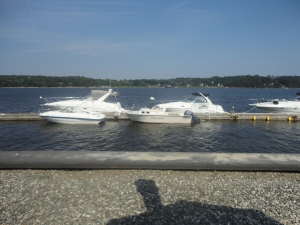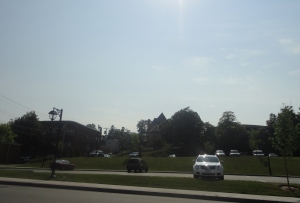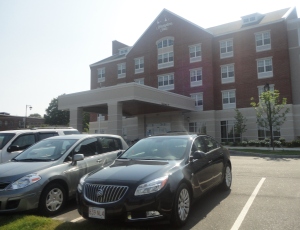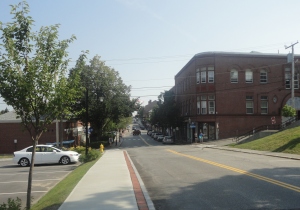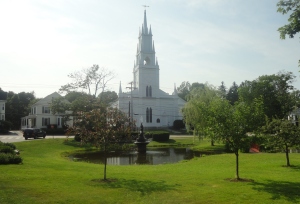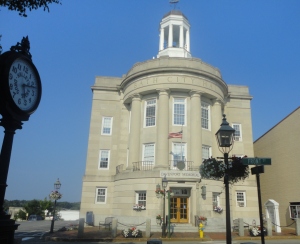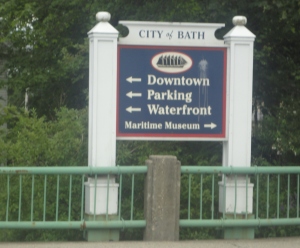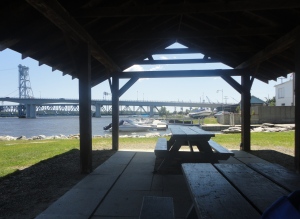
While I was convalescing in Maine, touring the city of Bath, Woolwich, and Portland, I usually walked around with copy of classic Robert Frost poems. One of his poem which caught my intriguing ear was titled: The Death of the Hired Man. The narrative was so moving, I couldn’t help writing a story based on it, titled: Son Came Back. The story does feel a lot American, I wish it didn’t. The idea was more Nigerian to me: about a mature couple bickering over the changed life of their only son. The reason behind the son’s changed life being a certain book the father once handed down to him. The book, for those unwilling to attend to the allusion, is the Bible. But I thought it won’t be good if I referred to it that way.
* * * * *
Son Came Back
Mother sat at the kitchen table with just the low flame from the lantern to comfort her. The windows stood open and from where she sat she could see the large plot of harvested farmland and the pathway that led through the grown stalks of maize crops, leading all the way towards town. There was the shadow of a quarter-moon revealing itself as the yellow sun sank gradually from all eyes down the edge of the world, taking the sky along with her.
There came a high rustling sound that sounded like a horse carriage being drawn to a halt, followed by the neighing chatter of horses—Father was home.
Mother left the table, taking the lamp with her, and hurried towards the front door of their cottage. Father had jumped down from the carriage and was busy stumping mud off the sole of his boots when Mother came out to the porch to meet him. Father looked up and caught right away the worried look in her eyes; immediately he knew something was wrong. He was about to enquire this question when Mother came to him, placing a hand on his chest as if to prepare him for the worse.
“Son was here,” said mother, then quickly added: “Please don’t be harsh.”
Father was speechless. He looked past her at the open doorway that led into their homestead as if expecting to see Son stumble out after her. A pressing wind blew at his face.
“When did he—”
“This afternoon,” Mother answered. “He was here this afternoon. I was attending to the farm with the extra hands that came from town when he showed up.”
“He didn’t stay for supper?”
Mother shook her head. “He wanted to, but he was afraid of you.”
“Yes,” Father muttered with a huff to his breath. “He has every right to be afraid. The little fool. I promised breaking his neck if next time he showed his face around here.”
“Please, Father . . . enough. He’s still your son.”
“Wrong, Mother! He was my son, once. That was before he began loving the Book. Then he had the nerve—the stupid nerve—to call me ‘ancient’. No . . . no, son ever should call his Father such a word and then expect to remain my blood. Not now and not ever.” He resumed stumping his boots.
“But it was you who gave him the Book—remember? You promised long ago that when he turned fifteen, you would give him the Book, and that was what you did.”
“Do not lecture me on promises I made and kept, Mother,” the man barked at her. “Yes, I made him that promise, and by my word and honor, I kept it and gave the Book to him the same way my Father too handed it to me when it was my time. But I was never consumed by it the way Son was. The Book swayed his mind. It took over him and turned him away from us.”
“Face it, Father. We could no longer keep him to ourselves. It wasn’t in our interest to keep doing so.”
“Nay, it wasn’t. Why else do you think I wished he’d never been ours in the first place?”
Mother couldn’t think of what to say to this. Father returned to the carriage and rode the horses around the back towards the shed where he then uncoupled the carriage from the horses’ handles. He locked up the horses for the night, leaving them with enough hay and filling up their bowls with water before taking off his jacket and returning to his home. Dusk had arrived; the crown of the sun was but a speck in the horizon, gone the next minute. The moon had taken its place.
Mother had drawn a bucket of water for Father in the bathroom and passed him a towel as he entered the bedroom and began taking off first his boots, then his work clothes. Mother left him to clean up and went into the kitchen to see about supper. While she worked the stove, her mind went to her son. How many years have passed since last time she and Father saw him. Since the last fight both men had and he’d promised running away and Father had sworn to bludgeon him if ever he caught sight of him again. Not a word had been exchanged after that. The following morning, Mother had gone searching for him in his room and found his bed empty. He had taken nothing with him, no clothes, nothing . . . except for the Book.
Father, done with having his bath and now dressed in his house clothes, trundled off to the kitchen where Mother had laid his meal in readiness for him. She sat across the table from him, a sad look on her face, and watched him settle down in his seat. Father unfurled his napkin, picked up his knife and fork, and without further ado, bent his head and began attacking his food. The lantern stood on the table between them. Outside the evening was dark and gloomy; a wild dog barked endlessly in the distance. Mother, seeing he was nearly through with his meal, got up and poured water into a cup for him. Father reached for the cup without a word said, and drained it down his mouth. He muttered a belch, raised his rump and farted, then kept on devouring his meal to the last bone. At last he looked up at Mother, wiping snot from his nose.
“Did he say anything about when he’d be coming back?” he asked.
“He didn’t say,” said Mother, getting up and taking his plate to the sink. Her hand-picked up the sponge and lathered it with soap. She looked out the window while her hands washed the plate and cutleries. “Didn’t say either if he would.”
“Hunh. I wouldn’t expect him to either.”
“He’s still your son.”
“Not anymore is he.”
“All right then . . . he is still my son. I still love him.”
“You can love him all that you want,” Father snorted derisively. “I don’t care. Just as long as I don’t get to see his hide again under this roof.”
Mother turned from the sink to glare at her husband; tears stemmed down from her eyes. “Don’t say that, Father,” she snarled at him. “Don’t you dare say that. Of course he’s welcome to this house whenever he wants. It’s his house, too.”
“So you say?”
“Yes, so I dare say, and more.” She became deflated, having expended her anger for the time being, and turned around to resume her washing. Her voice became sombre once more. “He’s our son—yours and mine to love and cherish. Yes, he did wrong calling you names, but so where you. You and him need to sit down and talk to each other—Father and Son.”
“Would he want to ever talk to me,” asked Father who was now fighting to remove a morsel of food that was caught between his premolars. “Remember he cursed me that day. Said he regretted the day he called me Father. Is that what a son is expected to say?”
Mother, having washed the plate and cutleries, placed them to the side to dry off. She picked up a napkin to wipe her hands dry before turning around to answer him. “It matters not what’s happened. That’s all in the past, and that’s where it should remain.”
Father got up from the table and approached the back window, staring at the doors of the shed with its roof-top light that acts as a solitary watch to the building.
“How did he look?” he asked. “What was he wearing?”
For the first time since she set eyes on her son, Mother’s lips turned into a smile. “He was looking very different. He has grown fine and handsome. He had on a brown suit and a hat. The way he stood there by the front door with his hat on . . . he looked far different from last time I saw him.”
“It’s the Book!” Father exclaimed, turning to face Mother. “It’s the Book that’s changed him. The Book almost always does that when you start soaking up its words. It has a strange type of power, that Book has. Father too was like that whenever he read from it. Once I asked him about it. He said the Book is truth. The sort of truth that never dies.”
Mother looked at Father astonished. “Your Father said this?”
“Aye, this and more he told me.” He returned to the kitchen table and dropped himself back on his chair. There was a contemplative look on his face as he pondered on the past. “He said the Book wasn’t one to be trifled with. And that it belonged to the people. Whatever he meant by that I just don’t know.”
Mother brought a chair beside Father and sat next to him. “But Father, all the time you had that Book, never once did I see you read from it. Why?”
“You know why. That Book is strange . . . but cursed. Cursed, I tell you. It would have changed me. I would have been . . . different. I was afraid of it. I couldn’t make sense of its words. So I locked it up.”
Mother didn’t say anything. Father looked at her and gave her a reproachful look.
“The Book was dangerous, I’m telling you, Mother. It would have changed me—taken me away from you like it did with Son, and I couldn’t let that happen.”
“You’re saying the Book was what took him away?”
“He said it to my face that day we quarreled. He said something about going out to spread the Word, whatever that meant. But I got a feeling he meant the Book. He said others needed to hear of what the Book was talking about. Even then I knew I couldn’t stop him . . . but I so much wanted to. I mean, who’s going to tend to the farm and the land once we’re gone?”
Neither of them said anything; their fears wouldn’t allow them to. Father noticed the flame of the lantern was starting to waver and grow dim.
“The kerosene’s almost finished,” he said. “We’d better go to bed now. Let the morning come and the day will take care of itself.”
He took Mother’s hand and helped her up. Mother and Father gazed into each other’s eyes for a moment, and saw the love they had for each other, and for their son who wasn’t there. Mother picked up the lantern’s handle and together they made their way towards the bedroom. In the distance, the dog’s persistent barking filled the night but was soon swallowed by it.







